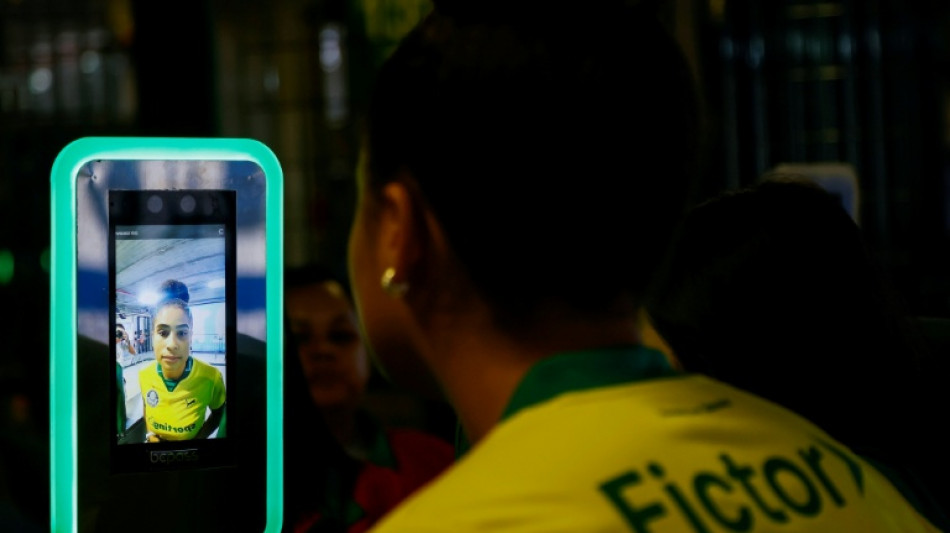
-
 Musk makes Davos debut with promise of robots for all
Musk makes Davos debut with promise of robots for all
-
Track star Sydney McLaughlin-Levrone announces pregnancy

-
 NYC sues to block Dr. Phil-fronted police documentary
NYC sues to block Dr. Phil-fronted police documentary
-
Basking in Oscar nod, Russian videographer ready for Hollywood

-
 WTO chief slams rise of trade protectionism
WTO chief slams rise of trade protectionism
-
Sri Lanka seal 19-run win over England in opening ODI
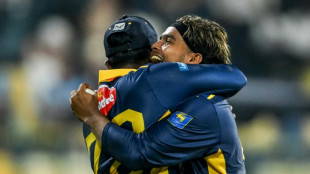
-
 Casemiro to leave Man Utd at end of season
Casemiro to leave Man Utd at end of season
-
Frank says troubled Spurs 'going in right direction'

-
 Springboks to meet All Blacks in USA for first time
Springboks to meet All Blacks in USA for first time
-
Men's fashion turns to embroidery as guys want 'something different’

-
 In fiery Davos speech, Zelensky blasts EU, says US 'security guarantees' ready
In fiery Davos speech, Zelensky blasts EU, says US 'security guarantees' ready
-
Macron squares up to Trump in rebel shades at macho Davos gathering

-
 Storms, heavy rain kill 14 across Afghanistan
Storms, heavy rain kill 14 across Afghanistan
-
Injuries force two changes in South Africa T20 World Cup squad

-
 In Greenland, locals fed up with deals done over their heads
In Greenland, locals fed up with deals done over their heads
-
Ex-marathon record holder Kosgei trades Kenya for Turkey at Olympics

-
 Ariana snubbed and Chalamet supreme? Five Oscars takeaways
Ariana snubbed and Chalamet supreme? Five Oscars takeaways
-
Germany summons Russian envoy, expels alleged spy handler
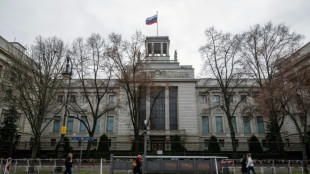
-
 Iran warns 'finger on trigger' as Trump says it wants talks
Iran warns 'finger on trigger' as Trump says it wants talks
-
Real Madrid stadium owners to face trial over concert noise

-
 'Sinners' breaks all-time Oscars record with 16 nominations
'Sinners' breaks all-time Oscars record with 16 nominations
-
South Africa's Kruger park suffers 'devastating' damage from floods

-
 Molinari leads Dubai Desert Classic as McIlroy struggles
Molinari leads Dubai Desert Classic as McIlroy struggles
-
Ligue 1 leaders Lens still waiting for PSG title charge

-
 US touts 'New Gaza' filled with luxury real estate
US touts 'New Gaza' filled with luxury real estate
-
Athens hit with several months of rain in one day: expert

-
 Ubisoft shares plunge after big-bang restructuring announced
Ubisoft shares plunge after big-bang restructuring announced
-
Mendis' unbeaten 93 anchors Sri Lanka to 271-6 against England
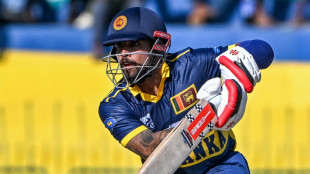
-
 Reeling Napoli face Juve after 'unacceptable' Champions League showing
Reeling Napoli face Juve after 'unacceptable' Champions League showing
-
Actor Liz Hurley in tears as accuses UK tabloid of 'monstrous' conduct

-
 What we know about Trump's Greenland 'framework' deal
What we know about Trump's Greenland 'framework' deal
-
Osaka 'confused' as testy exchange sours Australian Open win
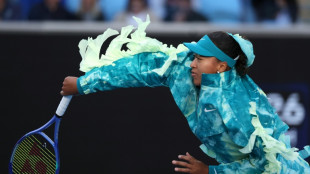
-
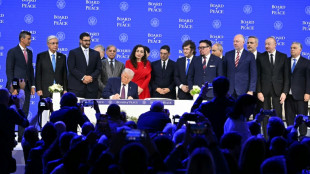 Trump launches 'Board of Peace' at Davos
Trump launches 'Board of Peace' at Davos
-
Stocks rally as Trump drops Greenland tariff threats

-
 Mercedes unveil 2026 F1 car for new 2026 rules
Mercedes unveil 2026 F1 car for new 2026 rules
-
Djokovic, Sinner plough on in Melbourne, Wawrinka makes history
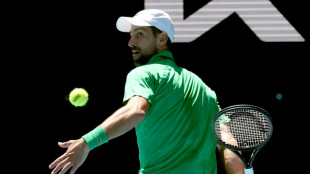
-
 Kitzbuehel's Hahnenkamm, the terrifying Super Bowl of skiing
Kitzbuehel's Hahnenkamm, the terrifying Super Bowl of skiing
-
'Oasis of stability': Madrid becomes luxury housing haven

-
 Swiatek says packed tennis season makes it 'impossible' to switch off
Swiatek says packed tennis season makes it 'impossible' to switch off
-
Sloppy Osaka grinds past 'mad' Cirstea to stay alive at Australian Open
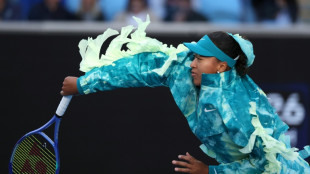
-
 Iran Guards chief says 'finger on trigger', warns US against 'miscalculations'
Iran Guards chief says 'finger on trigger', warns US against 'miscalculations'
-
Imperious Sinner barrels into Australian Open round three

-
 Storms, heavy rain kill 9 children across Afghanistan
Storms, heavy rain kill 9 children across Afghanistan
-
Games giant Ubisoft suffers share price collapse

-
 Exhausted Wawrinka battles on in Melbourne farewell after five-set epic
Exhausted Wawrinka battles on in Melbourne farewell after five-set epic
-
'Too dangerous to go to hospital': a glimpse into Iran's protest crackdown
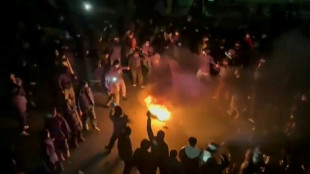
-
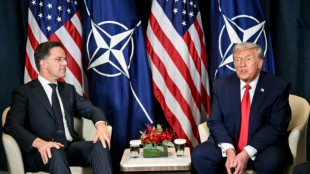 Bruised European allies wary after Trump's Greenland climbdown
Bruised European allies wary after Trump's Greenland climbdown
-
Austrian ex-agent goes on trial in Russia spying case

-
 Japan suspends restart of world's biggest nuclear plant
Japan suspends restart of world's biggest nuclear plant
-
Djokovic, Swiatek roll into Melbourne third round, Keys defence alive


To beat football violence, Brazilian clubs scan every fan
It was yet another tragedy linked to hooliganism in South American football: A young woman died after shards from a glass bottle thrown during a fight between fans sliced her throat.
This time, the culprit was arrested within hours thanks to a facial recognition system implemented in Brazilian stadiums in recent years.
Since July, the use of biometric controls, using fingerprints or facial recognition, have been required by law to boost security in stadiums with over 20,000 seats.
The young fan killed in 2023, Gabriela Anelli, was a fervent supporter of Palmeiras, one of Brazil's leading football clubs, and it was her team who were the first to fully roll out the security measure.
"We know exactly who is in each seat," Oswaldo Basile, the club's internal audit manager, told AFP.
"We can establish accountability if there are problems."
Palmeiras fans no longer need a ticket. They simply take a selfie on their phone and provide personal information on an app before going to the stadium.
Brazil has pioneered the technology in South America, but major teams like Argentina's River Plate are also adopting it.
To catch the fan who lobbed the deadly bottle at Anelli, Palmeiras used cameras to determine when it happened and to compare the faces of fans entering the stadium against people appearing on street videos capturing the incident.
- 500 Chilean fans blocked -
Facial recognition has been tested in European soccer stadiums, however data protection laws limit its use.
Some English Premier League clubs, and United States basketball, baseball and American football teams have implemented biometric identification, but its use remains controversial.
Brazilian clubs are required by law to protect personal data.
Tironi Paz Ortiz, CEO of Imply, a biometric systems company that works with teams in several South American countries, told AFP the law requiring the use of the technology represents "a major step forward" in the prevention of violence.
In May, the biometrics system at a stadium in northern Fortaleza blocked some 500 ticket purchase attempts by banned Chilean fans ahead of a match in the Copa Libertadores -- South America's top club football tournament.
The match between Fortaleza and the Chilean team Colo Colo in Santiago the previous month was suspended after a stampede left two teenage boys dead.
- Netting wanted criminals -
The technology has done more than filter football hooligans, it has allowed police to nab wanted criminals who enter stadiums.
Palmeiras have a deal with Sao Paulo police that has led to the arrest of more than 200 unsuspecting fugitives, including drug traffickers and murderers, who came to enjoy a game.
Lucas Lagonegro, a fan wearing a Palmeiras jersey, told AFP he feels "safer" entering the club's stadium.
"There are more children, more women, more families," said the 32-year-old lawyer.
The Beira-Rio stadium in southern Porto Alegre has had video surveillance cameras since hosting matches during the 2014 World Cup.
"But it was difficult to identify the perpetrators of offenses" before the implementation of facial recognition, said Andre Dalto, vice-president of the Internacional club which plays there.
Colombian sociologist German Gomez, who wrote a book about football fan groups and hooliganism, told AFP that biometric systems "can be useful as long as the other components of security -- police and the justice system -- are effective."
S.Gantenbein--VB
